#history rant
Text
A nightingale sang in the London Blitz
When exactly was that certain night, the night Aziraphale and Crowley met — and spoke for the first time in 79 years in the midst of the London Blitz?
And what’s the deal with the nightingale’s song, really?
Grab something to drink and we’ll look for some Clues below.
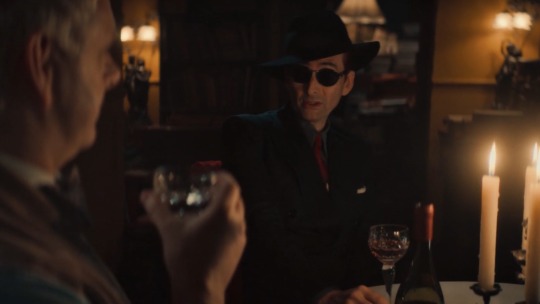
The night they met
The Blitz, short for Blitzkrieg (literally: flash war) was a German aerial bombing campaign on British cities in the WW2, spanning between 7 September 1940 and 10 May 1941. The Luftwaffe attacks were carried out almost non stop, with great intensity meant to force a capitulation and similarly strong impact on British life and culture at the time.
Starting on 7 September 1940, London as the capital city was bombed for nearly 60 consecutive nights. More than one million London houses were destroyed or damaged, and more than 20,000 civilians were killed, half of the total victims of this campaign.
The night of 29 December 1940 saw the most ferocity, becoming what is now known as the Second Great Fire of London. The opening shot of the S2 1941 minisode is a direct reference to recordings of that event, with the miraculously saved St Paul’s Cathedral in the upper left corner.
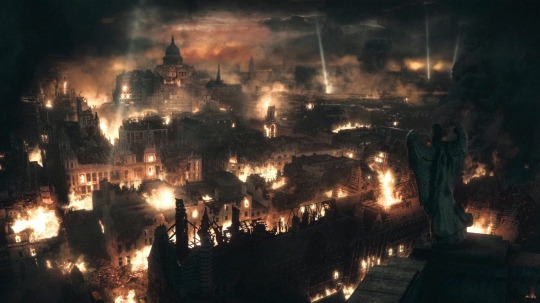
The actual raid lasted between 06:15 and 09:45 PM, but its aftermath continued for days. The old and dense architecture of this particular part of the city turned into a flaming inferno larger than the Great Fire of 1666. Multiple buildings, including churches, were destroyed in just one night by over 100,000 bombs.
Incendiary bombs fell also on St Dunstan-in-the-East church that night, the real-life location of this scene as intended by Neil. It was gutted and again claimed by fire in one of the last air rides on 10 May, when the bomb destroyed the nave and roof and blew out the stained glass windows. The ruins survived to this day as a memorial park to the Blitz.
Such a delightfully Crowley thing to do: saving a bag of books with a demonic miracle adding to the biggest catastrophe for the publishing and book trade in years. 5 million volumes were lost, multiple bookshops and publishing houses destroyed in the December 29th raid alone.

Even without this context, judging by the seemingly unending night, overwhelming cold and darkness, broken heating at the theatre, and seasonal clothing (like Aziraphale and Crowley’s extremely nice winter coats), it’s rather clear that it was the very beginning of the year 1941.
Everything suggests that Aziraphale and Crowley’s Blitz reunion happened exactly 1900 years after their meeting in Rome — which, according to the script book, took place between 1 and 24 January 41 (Crowley was right: emperor Caligula was a mad tyrant and didn't need any additional tempting; there's a reason why he was murdered by his closest advisors, including members of his Praetorian Guard, on 24 January 41).
Interestingly, both events involved a role reversal in their otherwise stable dynamic, with Aziraphale spontaneously taking the lead instead of letting the demon be the one to do all the tempting and saving, and ended with a toast.
The S2 Easter Egg with the nuns of the Chattering Order of St Beryl playing table tennis at the theatre suggests that the Blitz meeting happened on a Tuesday afternoon, which doesn’t match any of the above mentioned days, but sets the in-universe date for 7 January 1941 or later.
The Chattering Order of Saint Beryl is under a vow to emulate Saint Beryl at all times, except on Tuesday afternoons, for half an hour, when the nuns are permitted to shut up, and, if they wish, to play table tennis.
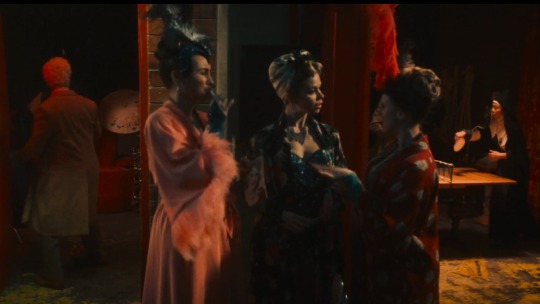
The nightingale
January means one thing: absolutely no migratory birds in Europe yet. They’re blissfully wintering in the warm sun of Northern Africa at the time. But, ironically, when the real nightingales flew off, a certain song about them suddenly gained popularity in the West End of London.
It might be a shock, but A Nightingale Sang in Berkeley Square wasn’t a hit from the start — even though its creators, Eric Maschwitz and Manning Sherwin, were certainly established in their work at this point. The song was written in the then-small French fishing village of Le Lavandou shortly before the outbreak of the Second World War with first performance in the summer of 1939 in a local bar, where the melody was played on piano by the composer Manning Sherwin with the help of the resident saxophonist. Maschwitz sang his lyrics while holding a glass of wine, but nobody seemed impressed. It took time and a small miracle to change that.
Next year, the 23-year-old actress Judy Campbell had planned to perform a monologue of Dorothy Parker’s in the upcoming Eric Maschwitz revue „New Faces”. But somehow the script had been mislaid and, much to her horror, replaced with the song A Nightingale Sang in Berkeley Square. She had never professed to be a singer but even so, she gathered her courage and went out onto the moonlit set dressed in a white ball gown. Her heartfelt rendition of the now evocative ballad captured the audience’s imagination and catapulted her West End career to stardom.
It was precisely 11 April 1940 at the Comedy Theatre in Panton Street and the revue itself proved to be a great success — not only it kept playing two performances nightly through the Blitz, but also returned the next year. And the still operating Comedy Theatre is mere five minutes on foot from the Windmill Theatre, where Aziraphale performed in 1941, and not much longer from his bookshop.
Now, most Good Omens meta analyses focus on Vera Lynn’s version of the song from 5 June 1940, but it didn’t get much attention until autumn, specifically 15 November, when Glenn Miller and his orchestra published another recording. And Glenn Miller himself is a huge point of reference in Good Omens 2.

According to the official commentary the infamous credits scene is establishing Aziraphale and Crowley’s final resolve for the next season using the same narrative device The Glenn Miller Story (1954) does in its most crucial scene. It starts with the tune (and audio in general) totally flat, then adds a piano on one side, and gradually becomes fully multidimensional. The Good Omens credits not only emulate the same sound effect, but bring it to the visual side of the narrative by literally combining the individual perspectives of the two characters together. Even though they’re physically apart, their resolve — and love to each other — brings them even closer than before. Aziraphale smiles not because he’s being brainwashed, but because he knows exactly what to do next.
Some of you might have noticed that Tori Amos’s performance for Good Omens is actually a slightly shortened version of Miller’s recording — much less sorrowful than Vera Lynn’s full lyrics that include i.a. this bridge:
The dawn came stealing up
All gold and blue
To interrupt our rendez-vous
I still remember how you smiled and said
Was that a dream or was it true?
Which is a huge hint when it comes to what we can expect from the main romantic plot line in the Good Omens series. The original song introduces an element of the doubt — it seems like there was no nightingale at all, only the mirage woven by the singer clearly intoxicated with love, much like Aziraphale and Crowley for the length of the last six episodes. Crowley’s comment in the season finale might allude to that interpretation, stating that there are no nightingales — never have been. It was all a dream. But the version we’re working with here is short and sweet, and devoid of that doubt. In the Good Omens universe angels were actually dining at the Ritz, the streets were truly paved with stars (or will be shown as such in the next season), and a nightingale really sang in Berkeley Square, as the omniscient, omnipresent, and omnipotent narrator, God Herself, had shown us.
All in all, it’s not an accident that the “modern” swing ballad activating Aziraphale’s memory and opening the 1941 minisode is the Moonlight Serenade by Glenn Miller. It’s a track naturally associated with A Nightingale Sang in Berkeley Square when it comes to music style and the sentiment in the lyrics.
But why the sudden popularity? In the great uncertainty and hardship of the Blitz, A Nightingale Sang in Berkeley Square provided solace and escapism for listeners, offering a glimpse of hope and love amidst the darkness of war. It became a universal anthem of resilience and a reminder of the power of love transcending difficulties. By January 1941 the whole city knew this tune by heart, including a certain West End aficionado with a cabinet full of theatre programs in his bookshop. Thanks to Maggie’s grandmother, he most probably had a record at hand to play during his spontaneous wine night with Crowley. We can only suspect the details, but it was was mutually established as their song exactly at that time or soon afterwards. Pretty sure we will see a third installment of that minisode for many, many reasons, but especially because of this “several days in 1941” answer by Neil:
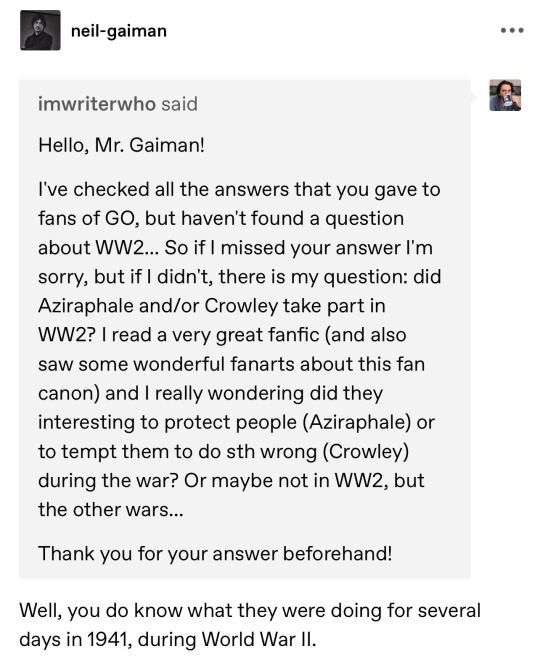
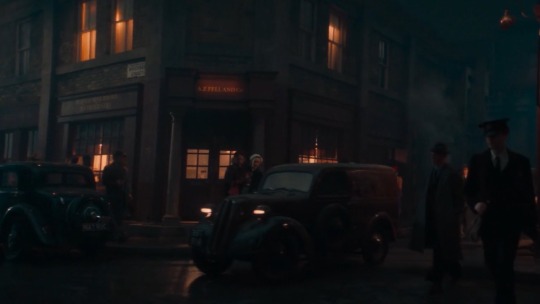
The Man Hunt
In 1941 A Nightingale Sang in Berkeley Square gained even more popularity as the romantic theme of the Fritz Lang’s newest film Man Hunt. The 1939 story by Geoffrey Household first appeared under the title “Rogue Male” as a serial in the Atlantic Monthly Magazine where it received widespread comment, soon becoming a world-wide phenomenon in novel form. Its premise criticizes Britain's pre-war policy of appeasement with Germany, ready to sacrifice its own innocent citizens to the tentative status quo. Sounds a bit like Heaven's politics, right?
Yes, I'm trying to make you watch old movies again — like all the other classics, Man Hunt (1941) is easily available on YouTube and other streaming websites.
The next part will include spoilers, so scroll down to the next picture if you prefer to avoid them.
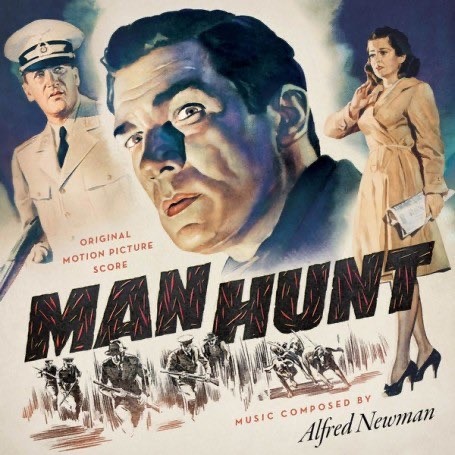
The plot of the movie seems simple enough: the tall, dark, and handsome Alan Thorndike, who nearly assassinates Hitler, narrowly escapes Germany and back in London continues to evade the Nazi agents sent after him with the help of a young trench-clad “seamstress” named Jerry, bridging the class divide and becoming unlikely friends-partners-romantic interests. It doesn’t end well though.
Jerry's small London apartment serves as a hideout for Alan when he was being followed by Nazis, similarly to how Aziraphale's bookshop is a safe haven for both Crowley and Gabriel in S2. She helps the man navigate the streets and eventually out of London — by sacrificing herself and getting forcefully separated from him by a patrolling policeman. The last time they see each other, Alan watches Jerry look back at him yearningly and disappear in the fog, followed by the elderly officer.
Unfortunately in the next scene we learn that the latter is a Nazi collaborator and helps the agents apprehend Jerry in her own flat. Staying loyal to her love and uncooperative, she’s ultimately thrown out of a window to her death, but posthumously saves Alan once again — through the arrow-shaped hatpin he gifted her earlier that is presented to him as the evidence of her off-screen fate.
Long story short, thanks to Jerry’s sacrifice Alan not only survives, but is able to join the war that broke out in the meantime and go back to Germany, armed with a rifle and a final resolve to end what he started, no matter how long will it take. The justice will be served and the dictator will pay with his life for his sins.
I wouldn’t be myself without mentioning that the main villain has a Roman chariot statue similar to the one in Aziraphale’s bookshop, an antique sculpture of St Sebastian (well-known as the gayest Catholic Saint) foreshadowing his demise, and a chess set symbolizing the titular manhunt/game of tag with the protagonist.
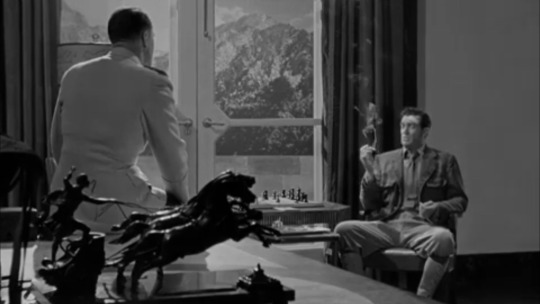
Aziraphale’s song
Will Aziraphale sacrifice himself as well? Or has he already? If his coin magic trick can be any indicator, we should expect at least a shadow of a danger touching the angel’s wings soon.
Let’s sum up the 1941 events from Aziraphale’s perspective: the very first time they’ve interacted after almost a century, Crowley actively sabotaged his entire existence twice by stepping onto a holy ground and by being outed by agents of Hell, both on the very same night and both because of his undying dedication to the angel. That’s enough of a reason not only for performing an apology dance, but also maintaining a careful distance for Crowley’s sake for the next 26 years. Only when he heard that his idiot was planning to rob a church, he gave up since he “can't have him risking his life”.
That’s when Crowley, sitting in a car parked right under his bookshop, offered him a ride. It wasn’t even subtle anymore. It was supposed to be a date, this time both of them understood it. But Aziraphale wouldn’t risk Crowley’s safety for his own happiness, especially not when he can name his feelings towards him and knows that they are reciprocated — the biggest lesson he learnt back in 1941.
So he did what he’s best at, he cut Crowley off again, but this time with a promise of catching up to his speed at some point. Buddy Holly’s Everyday, which was originally planned to play afterwards instead of the Good Omens theme, adds additional context here:
No, thank you. Oh, don’t look so disappointed. Perhaps one day we could... I don't know… Go for a picnic. Dine at the Ritz.
Aziraphale, carefully looking around and feeling observed through the whole conversation in the Bentley, consciously used the “Dine at the Ritz” line from A Nightingale Sang in Berkeley Square, from their song, as a code only the two of them understand. Not as a suggestion to go out for a meal, but a promise. A hope for the privilege of being openly in love and together — maybe someday, not now, when it’s too dangerous — even if it leads to a bad ending.
Fast forward to 2023 when for one dreadful moment Crowley’s “No nightingales” robbed Aziraphale even of that semblance of hope. He looked away, unable to stop his tears anymore. Only their kiss helped him pull himself together and make sure that a nightingale did sing the last time he turned — just like in their song — this time without a smile, as a goodbye.
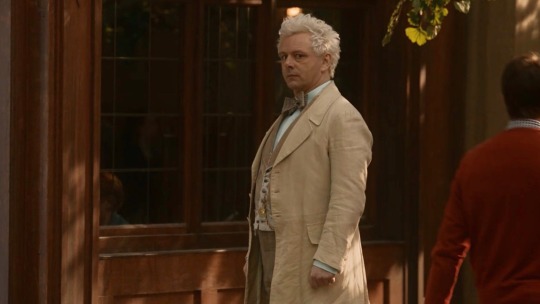
#a nightingale sang in the london blitz#the song is a code#and is miracled as a sign#aziraphale needs a hug#no nightingales#history rant#yuri is doing her thing#the good omens crew is unhinged#neil gaiman#st dunstan-in-the-east#1941 minisode#1941 flashback#a nightingale sang in berkeley square#good omens#good omens meta#good omens 2#go2 meta#go2#ineffable husbands#aziraphale#crowley#1941 aziraphale#1941 crowley#the blitz#man hunt (1941)#the glenn miller’s story (1954)#why am i like this#why do i do this to myself#long post
310 notes
·
View notes
Text
Great Men Theory - And Why It Sucks

When I already rant on my Sundays about historical misconceptions and how history is taught wrong, I cannot help but also talk about the entire Great Men Theory and how much it has influenced how we teach history to... basically everyone. This entire fucking theory goes back to a dude called Thomas Carlyle, who wrote in one of his books:
Universal History, the history of what man has accomplished in this world, is at bottom the History of the Great Men who have worked here. They were the leaders of men, these great ones; the modellers, patterns, and in a wide sense creators, of whatsoever the general mass of men contrived to do or to attain; all things that we see standing accomplished in the world are properly the outer material result, the practical realisation and embodiment, of Thoughts that dwelt in the Great Men sent into the world: the soul of the whole world's history, it may justly be considered, were the history of these.
And sadly... This way of talking about history is nice and convinient, no matter how factually wrong it is. Because instead of having to explore historical society and what made people back then "tick", you can can do: "And then this one dude did this. And this other big dude did that." And done.
Before I knew about this theory, I already encountered it. In the way many German kids will encounter it. Nazi Germany. Because while we have this big thing going about "rememberance culture" and what not... Yeah, we mostly talk about Nazi Germany, as if Hitler and some of his dude friends, like Himmler and Göbbels, did stuff and nobody else could've done something about it. And we will talk about the few folks who tried to do something about it. This leaves many under the impression that actually Hitler and his fellow friends were subjucating the German populus, who were unable to do a thing about the Holocaust or the war. And that... Just is not how it played out in reality. Most people in Germany at the time supported Hitler, knew about the Holocaust and were A-Okay with it.
And this is something that happens again and again in the way we talk about history. We talk about the big dudes and whatever they did or didn't do. Either as heroes or as villains. But we leave out all the people who were there to either enforce their policies, suffer from it, or rise up against it.
This creates a version of history, in which 99,99999% of all people were basically just "NPCs" in a game played by the few. Which not only does wrong by this majority of people, who might as well have had a hand in some of the things happening, but it also is used as a constant propaganda tool. Be it to ignore, how many attrocities have been supported and partaken in by a lot of people, so folks today do not need to deal with that fallout. Or be it to ignore the man, who have fought for a better outcome - often to either make protest seem senseless, or to make those few great man seem more heroic. (See also: Basically any anti-colonialist movement that got erased from history.)
I am not even denying that those in power had a bigger influence on history than anyone else. But not because they were born with some traits that made it so, but for the most part, because they were born into power through their bloodline, or at least into riches.
And it does not mean that nobody else had an influence, even if we like to forget the "everyone else" usually.
179 notes
·
View notes
Text
No more historically inaccurate Viking shows. I want a show that follows regular Norse people. Most of them are farmers. The ones that go out viking (because it’s a fucking VERB) don’t have heavy armor. No more white people in locs and cornrows. Give me hairstyles they actually wore. Give me loose fitting clothing (they didn’t cut clothes to be form fitting until ~the 14th century). They take bathing seriously. They mention ALL the gods and not just Thor and Odin. Just. Historically accurate Norse people.
#Vikings#history#rant#historical rant#Norse#old norse#the Northman was pretty close to this ngl#I liked when they tripped balls#history nerd#history rant
29 notes
·
View notes
Text

Here is my sketch of Callisto- A.K.A. the constellation Ursa Major!


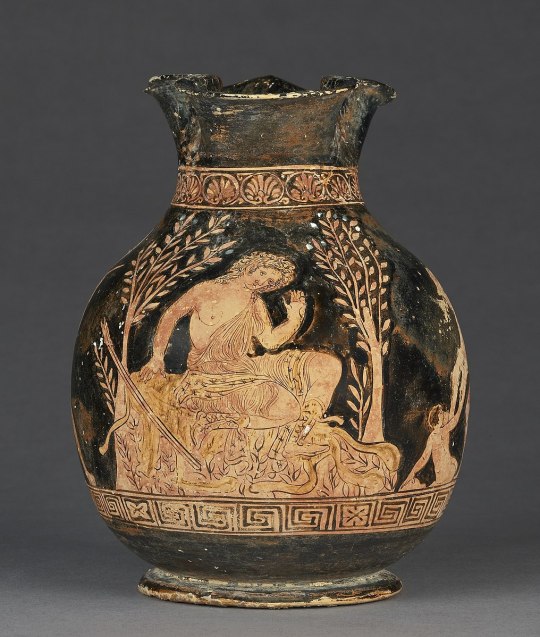
As the myth goes, Callisto was a nymph in Artemis's sacred entourage of female hunters. There are many versions of this tale involving how she was tricked, who turned Callisto into a bear, how her son died, and how she died. In fact, some say the myth dates all the way back to prehistoric times.
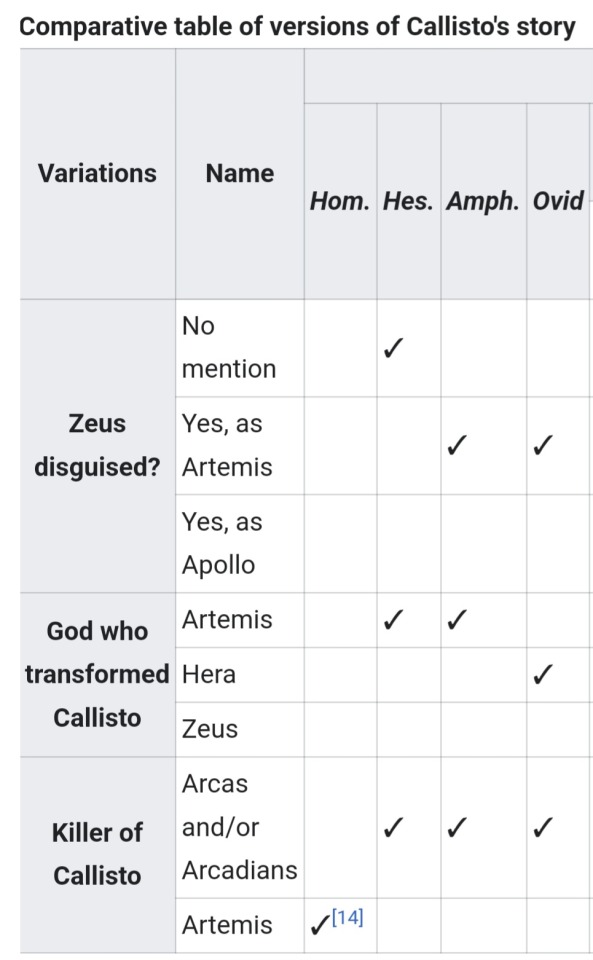
Callisto, Καλλιστώ, means "Most Beautiful" in greek. Artemis was called 'Artemis Kalliste' - Artemis the most beautiful. Many say this is how Callisto got her name. The ancient city of Arcadia was named after Arcas(Αρκάς), the little bear.




For fun, I based my sketch on Epiphany from Xena the Warrior Princess, who also has an animal son and a tragic story.

Well, that's my art and history rant! 🐍💕
I hope you enjoyed!
#ancient greece#greek mythology#ancient history#mythology#goddess#greek gods#feminism#mythology and folklore#constellations#history rant#xena warrior princess#epiphany#Castillo#ursa#ursa major#ursa minor#artemis#greek myth art#mythological creature#creatuanary#creatuanary2024#greek#myth#sketchbook#callisto
38 notes
·
View notes
Text
Ive been mentally consumed by a post i saw on tiktok about how things simple things we do today mirror what past peoples might classify as "rituals" or however it was worded, and it reminded me of post where someone was watching their child relative (niece i think???) finger paint, and they drew the connection about how humans used to do that but on cave walls.
And really...we're just the same people doing the same things but with different technology.
I cannot say how much i think about the roman face cream with finger streaks still in it, showing us that a roman girl cared for her skincare just as much as we do today
And there's grafitti on the walls of Pompeii telling us jokes we can find graffiti'ed today, or GODS the ones that say "someone was here" CATCHES MY THOUGHS SO MUCH. Like we think of modern graffiti as insignificant/a hindrance or whatever, but looking back those kinds of historical finds are monumental because it tells us in some small way that some human lived, had experiences, and they *did* things, mundane things but they still did them none the less.
There's woven baskets and healed fractures and dolls and cave paintings and tools, all of them coming from simple people who lived simple lives but left behind little stories about themselves, all through the simple tools they used in their regular every day life. It's just so,,, i can't explain how it makes me feel bc it's like connecting with people across time HUUUUUUUUUUUUUUU
im very totally normal about this i swear 💀
#wanchii history rant#GOD I LOVE HISTORY AND ANTHROPOLOGY AND THE INDOMINABLE HUMAN SPIRIT#i will never apologize for this#there maybe more later on the pompeii grafitti because i think its both HILARIOUS and utterly fascinating#history#ancient history#anthropology#history rant#thank you for attending my ted talk
21 notes
·
View notes
Text


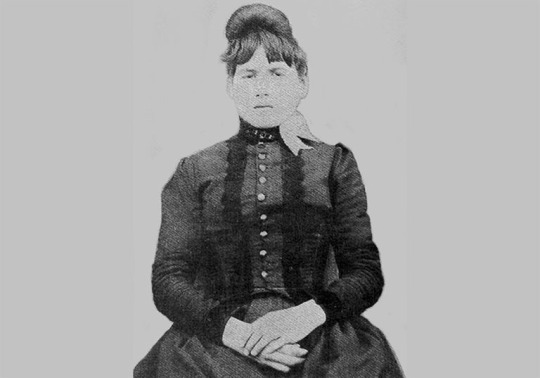
Today in 1897 Elva Zona Heaster is found dead in Greenbrier County, West Virginia. The resulting murder trial would be the only time in U.S. history where the alleged testimony of a ghost helped secure the conviction. What?! In October 1896, Zona met Erasmus Stribbling Trout Shue, and they married shortly after. The initial result of death was from childbirth and she would be buried the next day. Zona's mother, Mary Jane Heaster claimed her daughter's ghost came to her and told her that Erasmus had murdered her. After this event, Mary visited the local prosecutor, and whether he believed the ghost story or not, he reopened the case. It was determined that a complete examination of the body was not made and an exhumation was ordered. The second autopsy found Zona's neck broken, and her throat had finger marks. Shue was found guilty on July 11, 1897, and sentenced to life in
prison. Many people in the community believed the ghost story, however "the Greenbrier ghost was never mentioned by the prosecution and played no part in the case against Shue." Believe it, or don't history is fascinating.
#histoire#history#history in the making#history is awesome#history of science#history stuff#historyposting#today in history#history lesson#connecticut#history is all you left me#history lover#history will say they were best friends#west virginia#history aesthetic#history has its eyes on you#history era#history rant#history repeats itself#history today#ghost#spooky#spirituality#spiritual awakening
7 notes
·
View notes
Text
so the textbook my kids are learning thru stated that islam initially spread through trade missionaries, and then our lecture notes that i use stated that it was thru war
and i gotta ask the ppl who write these things: you realize two historical facts can be true at the same time? islam was both a peaceful spread and non peaceful. do you think christianity just spread bc everyone loved how peaceful it’s ppl were? bffr. by constantine there were christians part of the roman hegemony and they weren’t sitting on their hands. christianity is a faith that dictates love and peace, much the same way islam is.
christians performed military acts in its early years.
so did islam.
why do we teach kids that christianity was so hunky dory that ppl just flocked to it but then teach that muslims had to murder ppl to spread their religion?
don’t ask actually bc i already fucking know
6 notes
·
View notes
Text
"many historians say" is not a valid argument in a debate
Which historians say it? What sources are they using? What other work have they done? What specific points of evidence do they have? What do the historians who disagree say?
Many historians say I banged your mom last night
#history rant#rant#buzzfeed articles also don't count#or newspages with obvious political views they're trying to push#naw man give me papers!!#...#........#......................................................................................#leonardo davinci wasn't gay lenoardo davinci wasnt homosexual leonardo davinci wasn't a sodomite the only thing being sodomized is my brain
7 notes
·
View notes
Text
My sleep-deprived ramblings on Rome because I just finished reading the Gallic War and there is no way this man brought about the downfall of the Republic
Caesar was an idiot. That's it. Send Post.
No, but seriously. How did this guy ever manage to achieve anything of note in his life? Oh, he had powerful friends who paid for everything for him you say? It shows.
There are archaeological remains we have found of a Roman Fort around Ebbsfleet that confirm Caesar definitely landed in Britain like he said he did, but this man still had me doubting he even knew what a Britain was by the way he described it.
Then there are the random parts in the rest of the account where it's relatively normal if a bit obviously propaganda in places, and then he just goes on a tangent making up the wildest shit. Elks don't have knees guys, I pinky-promise. Then, even worse, later Roman writers don't even bother to check any of this bc it's Caesar and obviously he's like the coolest so why would he lie about anything, especially easily disprovable claims like ELKS DON'T HAVE KNEES!!! (Looking at you, Pliny).
That got me thinking that there's no way this doofus, this guy with the brains of a cardboard cut-out, could ever topple an entire countries system of government unless everybody running that government was somehow even dumber.
But he did. He did. And that explains so much. No wonder the Roman Empire was a constant shitshow, it was being run by people dumber than Caesar. They had 5 centuries of rule, and only about 3 of their Emperors were halfway competent. No wonder you could march an army up to Rome at any year during the entire Empire and the Roman Army had a chance of turning around and stabbing their own Emperor in response. Sometimes it's a 5% chance, sometimes it's a 95% chance, but it's never a 0% chance.
The Roman Empire truly is the final nail in the coffin of the concept of meritocracy. There is no way that this gaggle of fuck-knuckles should have been able to rule over half of a continent and parts of two more for centuries. The only reasonable explanation is divine intervention to keep this show (that definitely should have been cancelled after one season) running longer than the Simpsons.
#ancient rome#this should not be possible#rome#endless screaming#ancient history#antiquity#roman republic#roman empire#julius caesar#history#history rant
2 notes
·
View notes
Text
i feel like we dont talk enough about the fact that there was a plague that quite literally made people dance. a dancing plague. a disease dance
4 notes
·
View notes
Text
Vlad got handed over by his father to their enemies as a guarantee hostage, got his older brother blinded then burned alive, his father later beheaded, then he got betrayed by his younger brother, then again betrayed by the nobles and rich of his country and people had THE AUDACITY to go like "wow that man was so grumpy he's evil! He's the embodiment of evil!"
6 notes
·
View notes
Text
With the exception of Julius Caesar, and the burning of Alexandria, is there anyone you hate in history with the sheer unadulterated seething power of a thousand suns for all they deprived us of? Personally I absolutely fucking hate Saint Gregory of Tours for going through and absolutely leveling any temple or shrine he came across that was not to his god. He eliminated so much history and murdered so many people in the name of his own religion and I could throttle him in the most visceral and intimate ways and still sleep like a fucking baby for everything he did. UGH
#rant#history rant#Gregory of tours#saint gregory#Frankish history#historyblr#studyblr#college#collegeblr#academia#academics
5 notes
·
View notes
Text
Historical Travel in Winter

You know, because sick as I am right now watching so much stuff (because I cannot do a whole lot else right now). that I have come across one thing that really irks me right now. I have seen and read too many stories that do not quite get what winter meant in a historical setting for people travelling.
Let me first make one thing clear, because people seem to forget: We do have climate change happening right now. Winters were a lot harsher than they are right now a hundred years ago. Like a lot harsher. While of course not the entire winter was harsh - there would have been times when there was less snow and even rain during the witer months - there was generally a lot more snow fall than there is right now.
The next thing you need to understand is that obviously in historical times (and with that I do not mean until somewhere in the early 20th century for the most parts) the roads were not made with concrete, but were just basically dirt roads. And while some of the most important roads might in fact have someone on a horse drawn snowplow this was not true for all road.
Which means... Well, when there was a lot of snow there was a good chance that you would be fucked, because you could not use the roads. Which meant that for the most part there was not a lot of travel happening during the winter months outside what really needed to happen.
Folks, who were travelling by culture or occupation usually would find a place to winter. So they would find a place (often within a village or town) where they were welcome and spend the winter there. Because if they continued travelling they run the risk of being snowed in somewhere on the road and then freeze to death.
I am talking about this right now because I have now come across so much media where people in a historical setting just travelling during the winter and none of those issues ever coming up. And I find it... kinda a waste. Because it just kinda keeps up a narrative that somewhat acts as if our super mild winters are in any way normal.
You know, I grew up with older European media in which this was still a topic that came up. Which is kinda what annoys me so much in modern stuff, that ignore this.
But also, always remember those horror stories of travel parties getting snowed in an converting to cannibalism over it xD
72 notes
·
View notes
Text
If you refuse to learn more and change your opinion on history, like past events and people, and choose to just be ignorant and believe in what you were taught in elementary school, you're part of the problem.
We need to teach people to stop idolizing Christopher Columbus, and many of the US founding fathers. They were sick people. I shouldn't have to explain why, but if people ask me to, I will. Or you can just google it yourself, and see what atrocities they committed (more so Columbus, but many of the founding fathers were slave holders).
We need to stop believing that with every story, there was a clear good and bad side. In many cases, there are many layers to each side, and often the "good guys" are more cruel than we believe, and the "bad guys" are less cruel than we're taught. Of course, this is not every case, but there's plenty that I've learned this to be true about.
All of America is stolen land, whether you want to accept it or not. Hawaii is illegally occupied by Americans, and we're destroying their land and people just like we did to the Native Americans.
I could rant about this for hours, but I won't. My point is, you need to educate yourself further than primary/secondary education to fully understand these things, at least in my experience because my school system did not teach us the full truth. I've only started learning about it now that I am a history major in college.
#rant#history#history rant#fuck christopher columbus#fuck the founding fathers#america is stolen land#hawaii is illegally occupied
2 notes
·
View notes
Text

Here is my sketch of the three goddesses of Fury, The Erinyes.

The goddesses are very similar to Harpies and Gorgons. They typically wear snakes and have wings. They are hunters of men, and are known for their hunting boots, short skirts, and whips.

The three sisters appear as early as ancient Minoa, and are female goddesses that bring punishment onto wicked men. The original name for the trinity of sisters was "Strife" 𐀁𐀪𐀝𐀸.




The three sisters had no names until 90 BC , when they were given the roman names TISIPHONE (Vengful Destruction), MEGAIRA(Jealous Rage) , and ALEKTO(Endless Anger) .
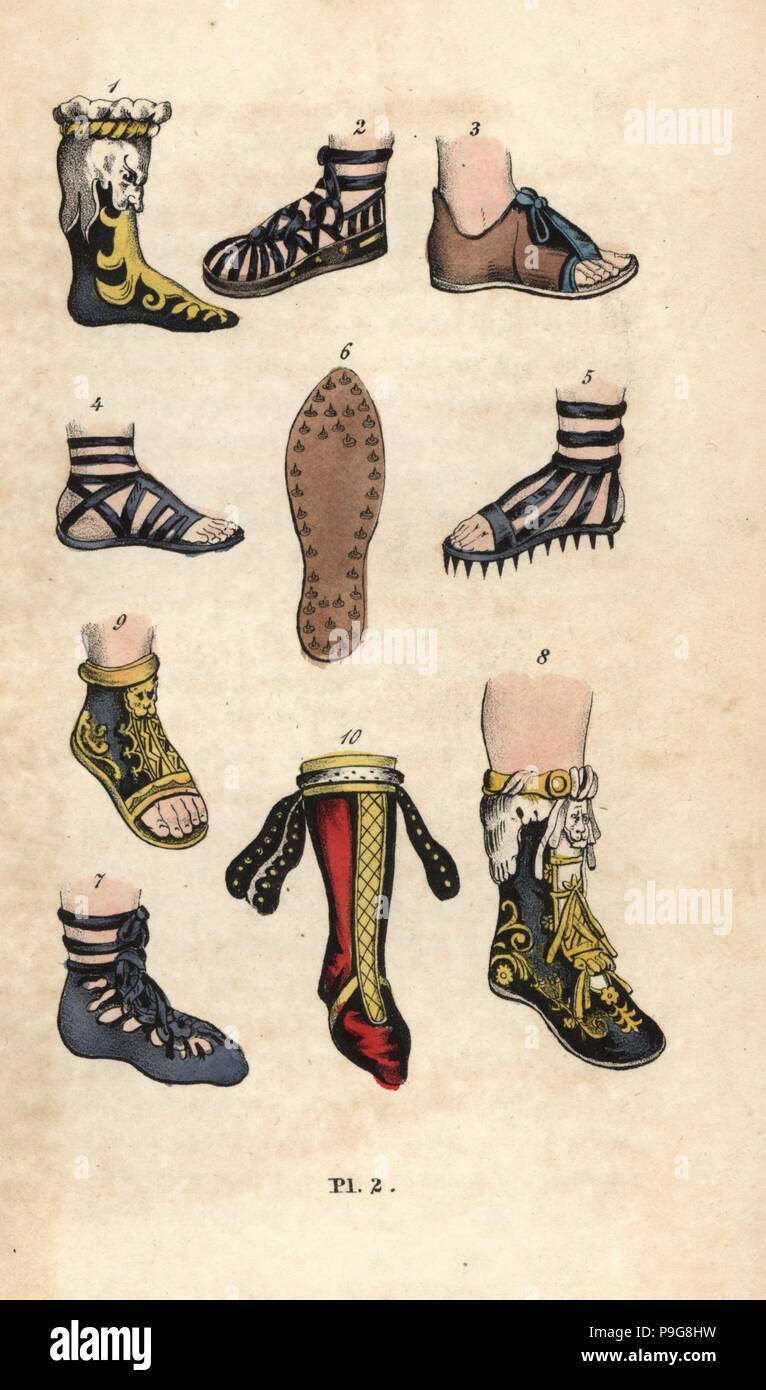

So I did research on 'hunting boots' of ancient Greece, and WOW! I want these boots so bad!😍
Alright, That's my art and history rant 🐍💕
#ancient greece#greek mythology#ancient history#feminism#medusa#mythology#mythology and folklore#goddess#gorgon#greek gods#harpy#female furies#the furies#erinyes#fates and furies#percy jackson#sketchbook#character design#history rant#mythological creature#creatuanary2024#creatuanary#jester#clown girl#festival
9 notes
·
View notes
Text
When I went to high school (2003-2006), I studied an elective course in archaeology and for my main project I decided to write about Çatalhöyük, a stone and copper age proto-city settlement in southern Anatolia. For as long as I can remember, I've always had a specific fascination with anything up to around Iron Age (to around 1000 BCE) and Çatalhöyük had really caught my attention because it's magnificent.
So, I wrote my project and handed it in... and almost got failed. Why? The teacher had never heard of Çatalhöyük and thought I made it up! I got furious and if I hadn't called it all racist bs (I did say some things I probably shouldn't have and for that I will always feel bad). Well, I didn't use the word racist, but something like "why? because it's not 'Western'?" And that was when it actually hit me how much history isn't taught in schools. Yes, we were taught about Aboriginals, Gupta Empire, Inca etc, but what about places like Çatalhöyük, Luxmanda, Jiahu, and Kotosh? And how many places will be lost forever because those who know about them die and no one listened to them?
I don't really know what I want with this post, but I just remembered once again about that project and my teacher's reaction and it still upsets me and there's so many amazing places and human creations that goes unnoticed and untaught just because it's not in the West and it pisses me off. (It's also why I hate programs like Ancient Aliens so much, like just because white people and western civilization can't do the thing doesn't mean that some people could at one time, white western culture is not the epitome of human civilization.)
Ok, rant over.
1 note
·
View note